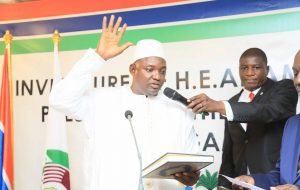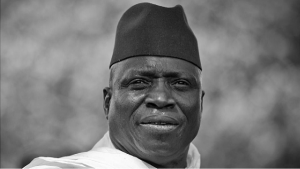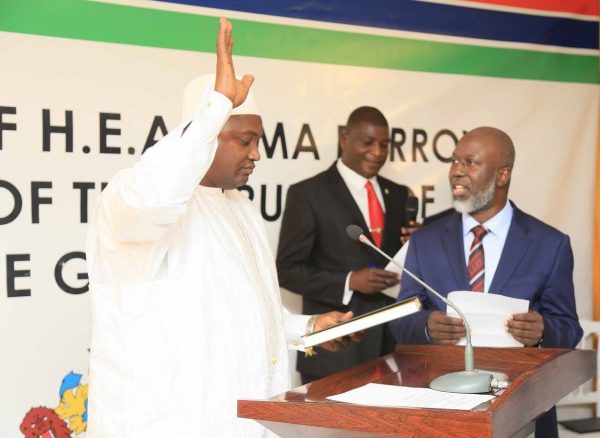 (JollofNews) – I am very much concerned with the situation in Gambia. Our brothers and sisters, who surrendered their sleep to vote for the next president for their country, are paying for exercising their birth right. The future of the Gambia is in the hands of God as of now.
(JollofNews) – I am very much concerned with the situation in Gambia. Our brothers and sisters, who surrendered their sleep to vote for the next president for their country, are paying for exercising their birth right. The future of the Gambia is in the hands of God as of now.
Over 45,000 people are reported to have fled to the neighbouring country, Senegal as the political impasse seems to be far from being calmed. This is the sign of immaturity of democracy. The immaturity of African democracy seems to take a detrimental slope. The voices of the citizens are not drilling into the auditory canal of the leaders. The hunger for power is costing the lives of innocent citizens. The Gambian people are not sure of the future of their country after President Yahya Jammeh refused to step down honourably as President of The Gambia.
Before Gambia’s President Yahya Jammeh, who has disputed his rival Adama Barrow’s election victory, many African heads of state have attempted, in some cases successfully, over the past few years to remain in power beyond their legal mandate.
In some countries, elections have been disputed amid deadly violence, as was the case in Kenya, Zimbabwe, Nigeria, the Democratic Republic of Congo, Togo and Gabon.
On November 28, 2010, in Ivory Coast, the second round of a presidential election – delayed six times since 2005 after a low-intensity civil war in the world’s top cocoa producer – pitted incumbent Laurent Gbagbo against his rival Alassane Ouattara.
But on December 3, 2010 the country found itself with two presidents: the constitutional council declared Gbagbo the victor, while the electoral commission said that Ouattara won. The UN recognised Ouattara’s victory and the European Union, France and the United States called on Gbagbo to step down.
On December 7, West African regional bloc ECOWAS said it recognised Ouattara as president and suspended the Ivory Coast’s membership. Two days later, the African Union also decided to suspend the Ivory Coast. A deadly four-month post-election crisis followed Gbagbo’s refusal to hand over power, in which more than 3,000 people were killed.
On April 11, Gbagbo was arrested by Ouattara’s troops after 10 days of fighting in Abidjan, backed by French and UN soldiers. On May 21, 2011, Ouattara was sworn in as president. Gbagbo is currently on trial before the International Criminal Court (ICC) for crimes against humanity in relation to the clashes.
In Madagascar, the island nation was paralysed by protests during a political crisis in 2001-2002. In January 2002, President Didier Ratsiraka’s rival, Antananarivo mayor and successful entrepreneur Marc Ravalomanana, sent his supporters into the streets claiming victory in the first round of presidential elections held in December 2001.
Ravalomanana refused a second round of voting, while Ratsiraka declined to concede defeat, plunging the country into seven months of violence and chaos. The impasse split the vast nation into two – with two capitals, two governments, and a divided army — until Ravalomanana was officially proclaimed president in April 2002 and sworn in on May 6, with Ratsiraka still disputing the result.
In July, 2002 Ravalomanana conquered the whole of the territory and Ratsiraka started a 11-year exile in France.
Going back to the Gambia, The Independence Electoral Commission (IEC) announced that the Opposition leader, Adama Barrow had won the 1st December, 2016 General Elections. President Jammeh in a ‘democratic and mature way’ congratulated Mr Barrow on his election as president of Gambia only to rescind the decision six days later. The Gambians’ dream of removing Jammeh is not yet over.
Election officials appeared to surprise even themselves by announcing Jammeh had conceded. “It’s very rare this happens,” said a nervous-looking election commission head, Alieu Momar Njie. Jammeh had given no indications he intended to preside over and respect a genuine election. He has a long track record of jailing, torturing and killing opponents and in the run-up to polling day declared himself “proud” to be a dictator called his opposition “evil vermin”, and vowed to bury them nine feet deep.
That made his televised address freely conceding defeat the day results came in utterly extraordinary. “You have spoken in no uncertain terms,” he told the Gambian people, an unusually wide grin on his face. “I want to make it very clear that I will never rule this country without your mandate and I will never cheat.”
However, the sudden change to reject the election results on what President Jammeh calls ‘massive election fraud’ has made The Gambia, to trail on a bomb. Leaders from ECOWAS have tried to plead with President Yahya Jammeh on a possibility of handing over power peacefully of which he vehemently rejected.

The 19th January, 2017 arrived and the new president was supposed to be sworn in. Adama Barrow who had fled to Senegal never dared to be sworn in the country he would become its leader. He chose to make history by being sworn in a foreign land. Immediately after being sworn in as President of the Gambia, reports flooded in to say Senegalese troops were heading to The Gambia to topple the defiant Jammeh. West African leaders’ mediation talks seem to falter. A legitimate president is in exile while the rebel is in state house.
It is not yet known how secured Mr Barrow will be if he goes to the Gambia. Will the soldiers be on his side or not? I fear for a poor voter in the Gambia who after exercising his birthright to vote is fearing for his life and that of his family members. I fear for the youth whose future looks gloomy as the danger seems approaching.
Greedy leaders such as Yahya Jammeh have threatened African democracy. They have put their own people in prisons. This seems to be a chronic disease in Africa especially our democracy.
Africa has the potential to tackle threats to democracy but it seems there is no will power. African Governments must learn to implement legal instruments and standards that will protect her citizens. For example, to manage natural resources in a sustainable way, needs mobilizing certain tools that deal with specific aspects of national resource development, mainly legal frameworks such as international and regional conventions and treaties such as the U.N. Convention Against Corruption, the OECD’s Multilateral Convention on Mutual Cooperation on Tax Matters and the African Union’s African Governance Architecture Convention.
African Governments must also condemn and reject unconstitutional changes of government. For democracy to prevail, fast ratification of instruments and constitutional change of governments-a change of constitutions to extend terms in office should not be accepted. Democracy should deliver its promises. Many political parties in Africa betray the electorate by failing to fulfill their promises especially on developmental activities. There is a need to ensure inclusive and sustainable human development for all and a better focus on poverty reduction, inclusive and representative politics.
Mr Jammeh is not the first leader in Africa to refuse to step down as a leader; he is one of those few heartless leaders who by their might think they are more powerful than the voice of the citizens. To them the blood of their people is the fuel to ensure them they remain in power. African leaders should learn to respect the voice of the citizens. If their times of power expire, they need to leave the office with diligent; otherwise they will end up dying in the bunker. I think Mr Jammeh whether he calls himself professor, will see sense in leaving the State House for the sake of the citizens he claim to ‘love’.
by Donasius Pathera,
Malawi






Yet again it is ordinary Gambians that will lose uot.
The Guinean president, though appearing as a peace envoy is, in my opinion, nothing but a thieve!
Himself a torturer, and human rights abuser, stand to benefit from all the loot to Gambia’s wealth that Jammeh has perpetrated. He will no doubt use that wealth to prop-up his regime and meanwhile Jammeh will continue to rape little girls with complete impunity. The guy is evil and belongs behind bars for the rest of his miserable life, not less that 2k kms away living in affluence. It makes Africa cheap before the eyes of the international community. F*** RIP OFF!!!